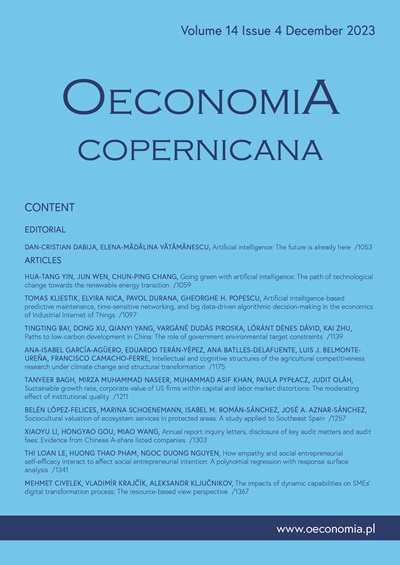基于区块链的金融科技管理中的人工智能算法和云计算技术
IF 10.8
1区 经济学
Q1 ECONOMICS
引用次数: 1
摘要
研究背景:金融科技的发展以创新的工具塑造企业投资效率和经济增长,降低企业融资约束,实现直接融资和间接融资,促进银行间竞争。基于众筹和区块链的金融科技业务利用深度和机器学习算法、增强和虚拟现实技术以及移动支付交易中的大数据分析。本文的目的:我们表明,金融科技通过利用基于人工智能的数据驱动算法以及云和区块链技术,重新配置了金融服务交付。金融科技优化了金融组织和服务、经济结构和增长、数据分析和数字银行绩效。机器学习算法可以简化支付操作能力和处理及时性,确保流畅的操作流程,评估风险,并通过跨即时支付网络和基础设施的历史数据和客户行为分析来检测欺诈和洗钱。方法:质量工具:AXIS、Eppi-Reviewer、PICO Portal、SRDR。搜索期:2023年7月。搜索词:“金融科技”+“人工智能算法”、“云计算技术”、“区块链技术”资料来源:195人中的40人。已发表研究:2023年。数据可视化工具:Dimensions和VOSviewer。报告质量评估工具:PRISMA。的发现,增加价值:金融科技的发展通过缓解信息不对称和融资限制,同时提供与产品和服务相关的金融援助和税收优惠,促进组织创新。金融科技的发展影响了金融机构在可持续性和经济发展方面的动态中介功能。金融科技和自然资源会产生负面影响,而绿色创新和金融发展会进一步影响环境的可持续性。本文章由计算机程序翻译,如有差异,请以英文原文为准。
Artificial intelligence algorithms and cloud computing technologies in blockchain-based fintech management
Research background: Fintech development shapes corporate investment efficiency and economic growth with innovative tools, and can decrease financing constraints of enterprises, enabling direct and indirect financing and furthering inter-bank competition. Crowdfunding- and blockchain-based fintech operations harness deep and maching learning algorithms, augmented and virtual reality technologies, and big data analytics in mobile payment transactions. Purpose of the article: We show that fintechs have reconfigured financial service delivery by harnessing AI-based data-driven algorithms and cloud and blockchain technologies. Fintech optimizes financial organization and services, economic structures and growth, data analysis, and digital banking performance. Machine learning algorithms can streamline payment operation capabilities and process promptness, ensuring smooth operational flows, assessing risks, and detecting frauds and money laundering by historical data and customer behavior analysis across instant payment networks and infrastructures. Methods: Quality tools: AXIS, Eppi-Reviewer, PICO Portal, and SRDR. Search period: July 2023. Search terms: “fintech” + “artificial intelligence algorithms”, “cloud computing technologies”, and “blockchain technologies”. Selected sources: 40 out of 195. Published research inspected: 2023. Data visualization tools: Dimensions and VOSviewer. Reporting quality assessment tool: PRISMA. Findings & value added: Fintech development enables organizational innovation by mitigating information asymmetry and financing limitations while providing financial assistance and tax incentives in relation to products and services. The fintech growth has influenced the dynamic intermediary function of financial institutions in terms of sustainability and economic development. Fintech and natural resources negatively influence, while green innovations and financial development further, environmental sustainability.
求助全文
通过发布文献求助,成功后即可免费获取论文全文。
去求助
来源期刊

Oeconomia Copernicana
ECONOMICS-
CiteScore
13.70
自引率
5.90%
发文量
26
审稿时长
24 weeks
期刊介绍:
The Oeconomia Copernicana is an academic quarterly journal aimed at academicians, economic policymakers, and students studying finance, accounting, management, and economics. It publishes academic articles on contemporary issues in economics, finance, banking, accounting, and management from various research perspectives. The journal's mission is to publish advanced theoretical and empirical research that contributes to the development of these disciplines and has practical relevance. The journal encourages the use of various research methods, including falsification of conventional understanding, theory building through inductive or qualitative research, first empirical testing of theories, meta-analysis with theoretical implications, constructive replication, and a combination of qualitative, quantitative, field, laboratory, and meta-analytic approaches. While the journal prioritizes comprehensive manuscripts that include methodological-based theoretical and empirical research with implications for policymaking, it also welcomes submissions focused solely on theory or methodology.
 求助内容:
求助内容: 应助结果提醒方式:
应助结果提醒方式:


